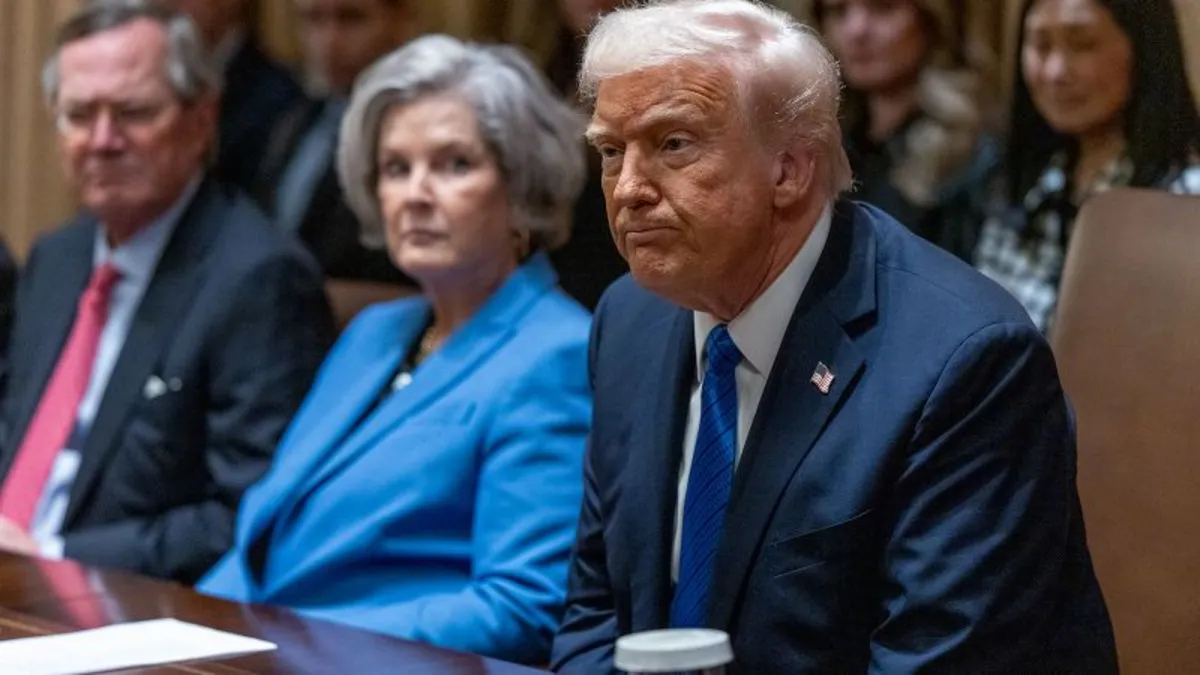
The White House has transitioned from a state of stunned inertia regarding the Yemen group chat scandal to a more aggressive stance, characterized by sharp attacks on its critics and a familiar defense: that President Donald Trump is a victim of a witch hunt. This shift was evident in Washington on Tuesday, following the revelations made by Atlantic journalist Jeffrey Goldberg. The administration's increasingly combative tone, coupled with the absence of resignations from key national security officials, indicates a strategy to resist accountability and reframe the controversy as another example of Trump’s ability to circumvent typical political constraints.
In a nation already divided over numerous issues, including the ongoing conflict with Iran-backed Houthi militants, the political fallout from this scandal may be minimal. The substance of the group chat, however, raises significant concerns about the reputations of Trump's national security aides and offers critical insights into the administration's perspective on global affairs and its approach to wielding American power.
Trump’s foreign policy team, often celebrated for their aggressive diplomacy, has found itself in a compromising position. The President's inclination to prioritize a visually appealing public image and unwavering loyalty over seasoned expertise in his Cabinet selections has led to a situation where sensitive discussions regarding military operations were conducted via mobile devices, exposing them to foreign intelligence scrutiny.
Defense Secretary Pete Hegseth, in particular, exemplified this trend during the leaked chats. His confidence in the team’s operational security, coupled with a post-strike display of emojis and self-congratulation, seemed more fitting for teenagers than seasoned national security professionals. This raises questions about the credibility of Trump's foreign policy apparatus.
The standing of National Security Adviser Mike Waltz, who reportedly included Goldberg in the chat, may have suffered irreparable damage. Although Waltz is a decorated Green Beret and respected within the foreign policy community, his association with this scandal could affect his ability to operate effectively in his role. Trump’s penchant for demanding public loyalty from his subordinates further complicates Waltz’s position, as he navigates the fallout from the scandal.
The leaked chat also revealed a troubling sentiment toward European allies, suggesting a significant rift in the transatlantic alliance. Comments made by White House officials indicate a deep-seated animosity toward Europe, which may have been exacerbated by the administration's transactional approach to foreign policy. One participant expressed frustration over “bailing Europe out again,” highlighting a perception that European nations are not contributing their fair share.
Hegseth's disparaging remarks about European "freeloading" and another chat member’s comments about requiring Europe to compensate the US for military actions against the Houthi rebels further illustrate a concerning trend. This transactional mindset poses challenges for diplomatic relations and undermines the longstanding partnership between the US and Europe.
The controversy surrounding the group chat has also overshadowed ongoing efforts to address the conflict in Ukraine. Recent discussions in Saudi Arabia aimed at reaching a ceasefire have yielded limited results, with Russia imposing strict conditions that complicate negotiations. Ukrainian President Volodymyr Zelensky has accused Russia of attempting to deceive US mediators, raising doubts about the administration's ability to effectively navigate these complex diplomatic waters.
As the Trump administration seeks to bring an end to the Ukraine conflict, skepticism surrounding its intentions and strategies continues to grow. The approach taken by the administration, especially in light of the leaked chat, raises questions about its commitment to genuine diplomatic efforts and its understanding of the geopolitical landscape.
In a notable shift in US foreign policy, the intelligence community has begun to emphasize the threats posed by transnational criminals and drug cartels, particularly those based in Mexico. During her testimony, Director of National Intelligence Tulsi Gabbard highlighted the significant dangers these organizations pose to the United States, aligning with Trump’s longstanding concerns regarding undocumented immigration and drug trafficking.
This heightened focus on Mexico-based cartels coincides with an increase in military surveillance operations targeting these criminal organizations. The implication of potential military action against cartels raises further questions about the administration’s approach to national security and its willingness to confront these challenges head-on.
The ongoing Yemen group chat scandal is a microcosm of the tumultuous political landscape surrounding the Trump administration. As the White House grapples with the fallout from this incident, the implications for national security, foreign relations, and domestic policy remain profound. The administration's responses, characterized by defiance and aggression, may ultimately shape its legacy and the future of American diplomacy in an increasingly complex world.